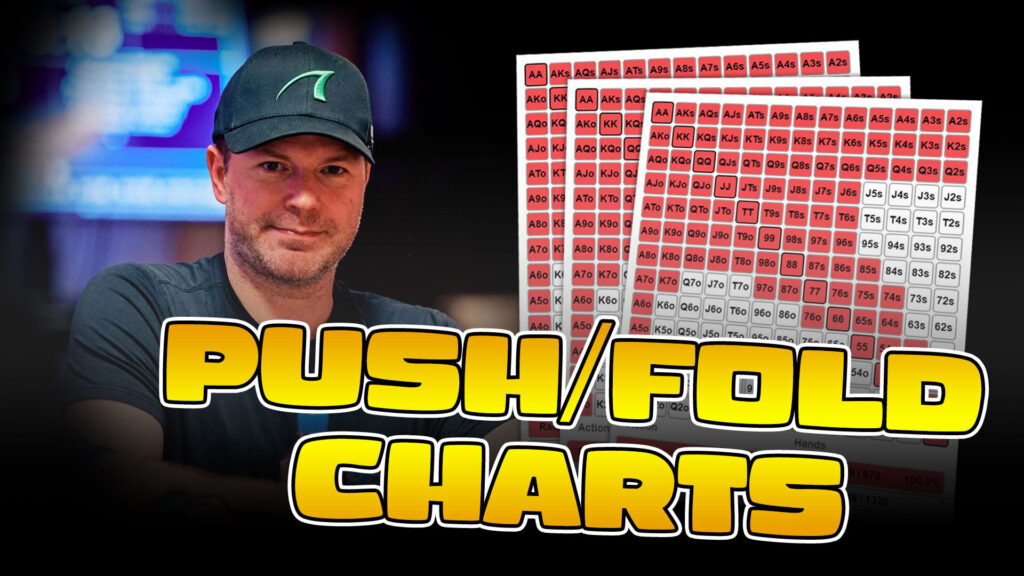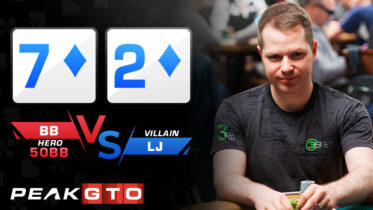Rumor has it that the poker games are much bigger and splashier in the Lone Star state of Texas. Playing a $2/$5 cash game at the Texas Card House, Rosey from NextGenPoker looked down at pocket jacks and faced some aggression from a player that had been running over the table. The feeling of holding a premium poker hand can sometimes be soured when you see a monotone board on the flop, were Rosey’s pocket jacks still good by the river?
The Game: $2/$5 Cash Game
Effective Stack: 148 Big Blinds
Where: Texas Card House, Austin, Texas
This video comes from Jonathan Little’s YouTube Channel. If you would like to stay up to date with more video content such as this, including hand breakdowns from Hellmuth vs Dwan, Garrett Adelstein, Brad Owen and more, check out the channel!
Preflop Analysis
Folded around to in the cutoff, Rosey raised $20 after looking down at J♥-J♠. The player in the small blind, who had been three-betting Rosey all night, three-bet him again for $70. Holding a premium hand and not wanting to back down to his newfound rival, Rosey executed a $175 four-bet which his opponent called.
Playing a GTO strategy 150 big blinds deep, you really don’t want to be making a ton of four-bets preflop. While sometimes you can mix in four-bets with pocket jacks, it is disastrous when you four-bet and your opponent elects to shove. Pocket aces, pocket kings, and a variety of suited-ace hands are better hands to four-bet in this spot.
Having a strong hand and the benefit of position, Rosey was better off just calling his opponent’s three-bet, but what would happen on the flop?
Monotone Board On The Flop
The Pot: $355
The Board: K♠-7♠-4♠
Effective Stack: 108 Big Blinds
Rosey: J♥-J♠
Flop Analysis
With nothing but spades on the flop, Rosey’s opponent checked. Despite having a spade, Rosey elected to check it back and see what would develop on the turn.
In general, Rosey should bet frequently for a small sizing in these spots. Considering his range, Rosey had plenty of kings and suited aces that wouldn’t mind adding money to the pot. Additionally, the three-betting range of his opponent contained hands Rosey was ahead of on this board. If the opponent had three-bet with a hand like A-10, Rosey was well ahead and benefited from adding money to the pot.
With such a strong range that could easily connect with the board, Rosey should have bet, but only for a small sizing. Betting large would have only induced his opponent into folding before adding additional money to the pot, and if Rosey happened to be crushed, he would be setting himself up to lose all of his money.
If Rosey were to have bet and been met with a raise, he would have had to call. While he may be behind hands containing aces and kings, by holding the J♠ he could still maintain an out with a flush draw. Additionally, even if he was reraised Rosey could still have been ahead with his pocket jacks if his opponent elected to go for it while holding the A♠.
Facing A Lead On The Turn
The Pot: $355
The Board: K♠-7♠-4♠-5♣
Effective Stack: 108 Big Blinds
Rosey: J♥-J♠
Turn Analysis
With a blank on the turn, Rosey’s opponent led out for $150. Citing the strength of his hand and the potential to still be ahead, Rosey called.
While his opponent’s turn bet may have seemed a bit scary, it was actually in Rosey’s best interest. Being a loose, aggressive player that had been battling the entire session, Rosey’s opponent could very well make the $150 lead bet with plenty of hands Rosey beat. Not only did Rosey have a good hand to call a turn bet with, but he also could rationalize calling a similar bet on the river.
Considering the opponent’s range, there weren’t that many kings to consider since he flatted Rosey’s preflop four-bet. With a smattering of unsuited A-X hands still in his opponent’s range, Rosey was wise to call the turn bet.

Make the best preflop decisions with Jonathan Little’s Push/Fold Charts!
Another Overcard On The River
The Pot: $655
The Board: K♠-7♠-4♠-5♣-Q♣
Effective Stack: 85 Big Blinds
Rosey: J♥-J♠
River Analysis
The Q♣ was a nasty card on the river for Rosey to see. Following a check from his opponent, Rosey was left with the decision of whether or not to go for the bluff.
Contemplating a bluff, the decision for Rosey came down to whether or not he thought his opponent would fold a queen. If they had a king, there was a very low probability the opponent would fold, but with the action in the hand, it did not seem like Rosey’s foe had top pair. While the range of his opponent was worth considering, the stack-to-pot ratio was another relevant factor worth noting. With the pot well exceeding the stacks of both players, a paired queen could find a crying call purely due to the amount of money in the pot.
Holding a hand that could still be ahead, Rosey made the correct decision to check it back, but were his pocket jacks good?
Conclusion
After both players checked the river, Rosey would, unfortunately, see his opponent flip over A♠-Q♥. Having navigated the hand well until the unfortunate river, Rosey may have lost the hand, but through composure and proper play was able to limit his losses. Monotone boards can create tough spots and be difficult to play if not studied. While hard to play with jacks, how does Matt Affleck think you should play monotone boards with pocket aces?




